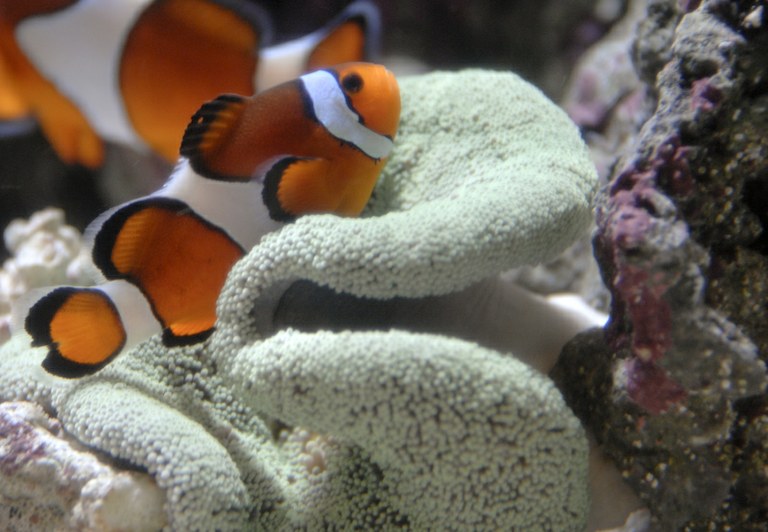Background
In 2012, the environmental activist group The Center for Biological Diversity petitioned NMFS to list seven pomacentrids (damselfish and anemonefish) under protection of the Endangered Species Act (ESA). These species are:
- Amphiprion percula
- Chromis atripectoralis
- Chromis viridis
- Dascyllus albisella
- Dascyllus reticulatus
- Microspathodon chrysurus
- Plectroglyphidodon dickii
This month, the NMFS determined that of the seven petitioned species, none of the damselfish warranted protection. However, “for A. percula, we find the petition presents substantial information to indicate this species may be warranted for listing.”
As a consequence of its preliminarily findings, the NMFS is now seeking public comments on percula clownfish in its status review process to determine whether A.percula should be listed as either Threatened or Endangered.
From the NMFS:
To ensure that the status review is comprehensive, we are soliciting scientific and commercial information pertaining to A. percula from any interested party. Specifically, we are soliciting information, including unpublished information, in the following areas: (1) historical and current distribution and abundance of A. percula throughoutits range; (2) historical and current population trends for A. percula; (3) life history and habitat requirements of A. percula; (4) genetics and population structure information (including morphology, ecology, behavior, etc) for populations of A. percula; (5) past, current, and future threats to A.percula, including any current or planned activities that may adversely impact the species;(6) ongoing or planned efforts to protect and restore A. percula and its habitat; and (7) management, regulatory, and 65 enforcement information pertaining to A. percula. We request that all information be accompanied by: (1) Supporting documentation such as maps, bibliographic references, or reprints of pertinent publications; and (2) the submitter’s name, address, and any association, institution, or business thatthe person represents.
What this means for aquarists
The results of the review process could lead to three possible outcomes:
- NMFS finds, after review, that percula clowns do not warrant any protection status. The process ends here.
- NMFS lists percula clownfish as Threatened. Threatened status will likely have no immediate impact on aquarists, but it is possible that the NMFS recommends specific prohibitions for percula clownfish at the time of its determination.
- NMFS lists percula clownfish as Endangered. We believe this outcome is unlikely. However, should NMFS determine otherwise, this outcome would have very dramatic and immediate effects on the marine aquarium hobby. It is illegal to trade or own any species protected by the ESA as Endangered. This would mean it will become illegal to import, breed, sell, purchase, or own percula clownfish, one of the most recognizable marine species kept by aquarists. The ESA sets strict “all or nothing” regulatory policies. In other words, don’t expect special exemptions for captive-bred specimens.
Note: The ESA is a United States legislation with jurisdiction only within the USA. However, international treaties such as CITES takes guidance from other conservation entities like the IUCN and ESA, so this issue has greater potential scope than just the United States.
What can aquarists do?
It’s important to understand that the aquarium hobby plays a small role in NMFS’ evaluation. Habitat destruction, coastal development, pollution, ocean acidification, and climate change all dwarf the hobby’s pressure on wild A.percula populations.
Why is this point important? Because the NMFS does not care whether aquarists are good stewards of percula clowns. The NMFS does not care if a great percentage of percula clownfish traded within our hobby are captive bred. The NMFS does not care that our hobby has contributed a great deal of knowledge to this species and its reproduction. Past good deeds will not grant our hobby special consideration or a free pass.
The NMFS cares mostly about one thing: biological data.
If data shows that percula clownfish are truly under threat by any combined forces (e.g tourism, sewage, warming waters, a sponge who lives in a pineapple under the sea, etc.), the NMFS will move forward with some degree of protection for the species.
Thus, our hobby needs to support organizations who can contribute biological data. One such organization is the Pet Industry Joint Advisory Council (PIJAC), whom we’ve written about in the past. PIJAC has set up a Marine Ornamental Defense Fund to serve as the voice of our hobby when it comes to pending legislation such as ESA reviews. During NOAA’s evaluation of 66 coral species petitioned for ESA protection (22 of which are now listed as Threatened), PIJAC submitted letters and data to NOAA for the review process. And the same is required for the evaluation of percula clownfish.
While the fight over public opinion is important in the world we live in, the ESA review is largely a fight over science. Going forward, our hobby should also collectively support research that gives us a clearer picture of the threats tropical marine species face. Our hobby should support conservation efforts – not just because it’s good PR nor just because it is the right thing to do but also because this is the type of action specified by the ESA which can influence whether corals are listed for protection. In the case of A.percula, imagine a hobby that helps restore A.percula populations in their native habitat. We have the means (e.g. captive breeding techniques we developed). We just need the will.
Above all, we must maintain vigilance because petitions based on dogma will continue as long as idealists exists.
Respect(ing data) is a two way street
Aquarist must also respect data, even if it means it harms our hobby. Good policy is based on good information, not agenda. The ultimate goal is not about the defense of our hobby. It’s about the defense of science and the sustainability of the animals we are privileged enough to care for. If data tells us species are under threat, we should not obstruct conservation to protect our self-interests.











0 Comments